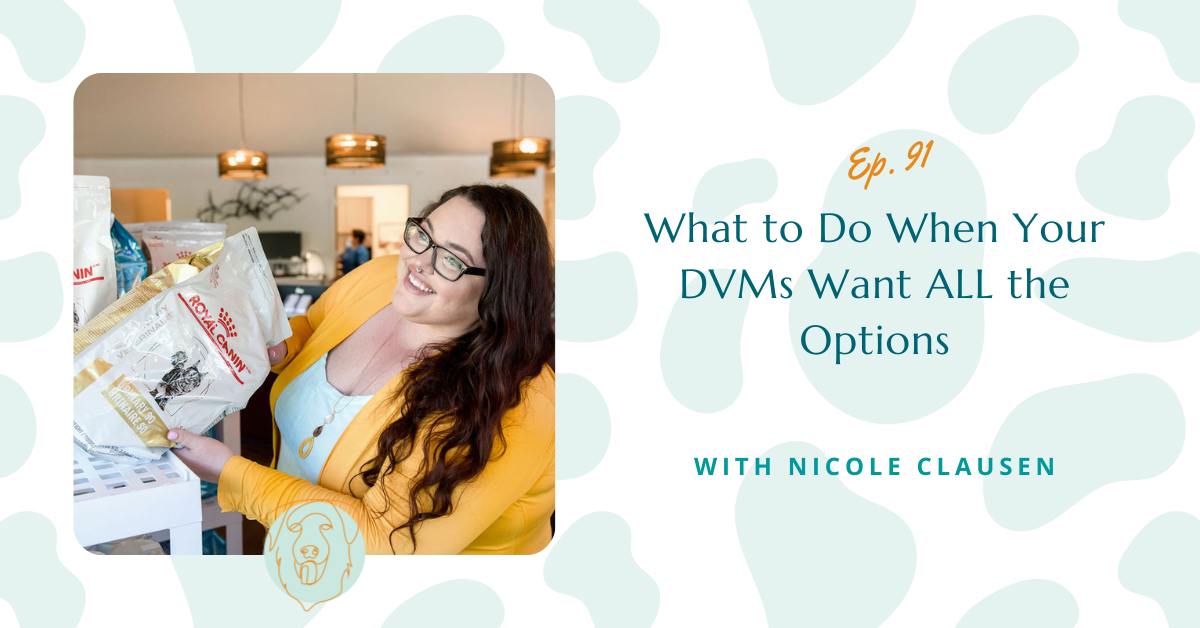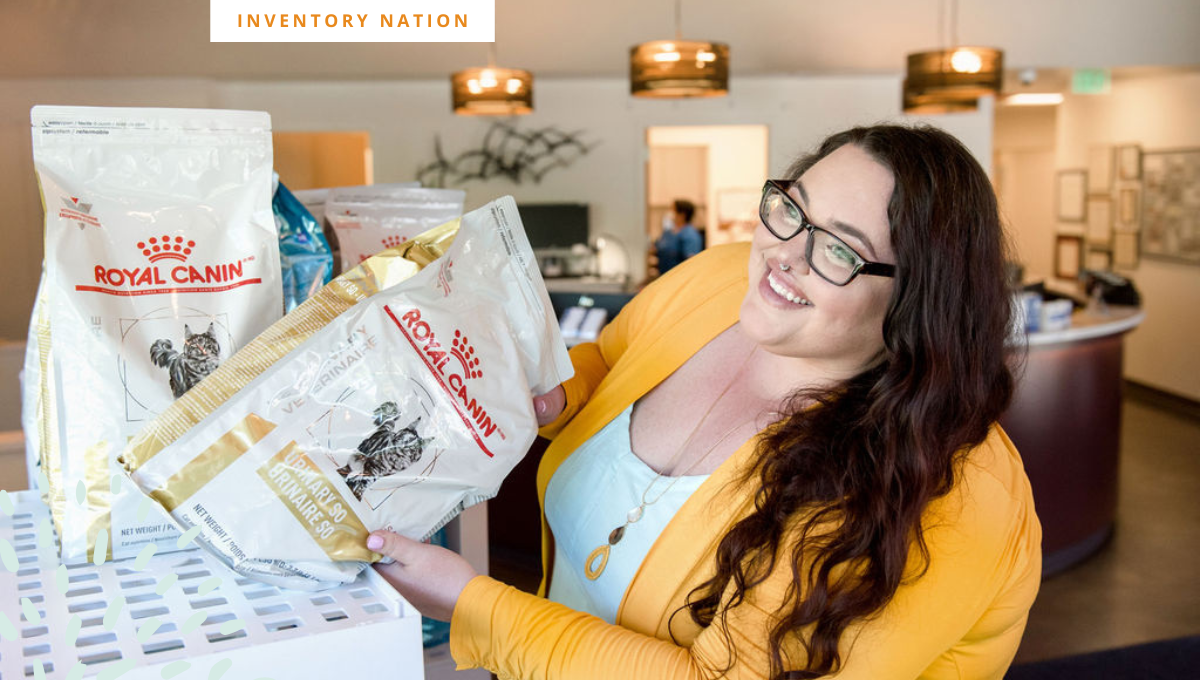TUNE IN: APPLE PODCASTS | SPOTIFY | GOOGLE PODCASTS | AMAZON MUSIC
Here’s a scenario you may have experienced (and stressed over): Your DVMs seem to want ALL the options on the shelves and right NOW! On this episode of Inventory Nation our host, Nicole Clausen, shares a systematic framework to help you navigate what’s already in stock, massage the flow of products and create ordering procedures to accommodate (but not over-provide for) the demands of your practice. For many care providers, an understandable (but unnecessary and unhelpful) scarcity mindset can overwhelm good planning. That’s where our job as analytical, well-informed inventory managers comes into play. We are able to explain the implications of carrying unpaid goods over long periods of time, the risks of expirations and tying up money that could better be used elsewhere. You’ll learn about steps to take and processes to put in place that will provide guardrails (and boundaries!) when you’re feeling pressured to make decisions that aren’t documented, data-backed or fully informed by the kinds of financial realities they don’t teach in vet school! If you’d like to learn more, Nicole offers an entire module to help inventory managers keep that delicate balance – between satisfying what the team wants with what the practice truly needs and can manage effectively – to the good of all, patients included!
It’s not too late to nominate yourself or someone you want to honor for Inventory Manager of the Year 2023! Just visit this link to find out lots more about how to submit your candidate (self-nominations welcome!) for well-deserved recognition as well as great gifts courtesy of our sponsors, Epicur Pharma and VetCove, and unlimited access to all of Nicole’s classes!
And stay tuned for Nicole’s upcoming July webinars, including content focused on keeping your inventory management system accurate and how to lower your COGs.
Would you like to learn more about Inventory 911 Toolkit, our step-by-step blueprint to help inventory managers optimize knowledge, strategy and confidence? Click here!
You can also join the Inventory Strategy Network – our free virtual neighborhood for inventory managers and other veterinary professionals – by visiting this link.

EPISODE HIGHLIGHTS
- Note to Self: Even when DVMs seem to be extra-demanding, they are generally still coming from a good and caring place.
- Scarcity Mindset: Once an evolutionary advantage that protected us from running out of resources, our modern lives and practices needn’t be driven by fear and deprivation.
- Strategy to Bring Abundance? Practice gratitude for and mindfulness about those resources that are available in the present moment.
- Reorienting Your Mind: Does having a multitude of options make you feel more in control and safe in your planning on a daily basis? All good, but be careful not to let your “scarcity brain†lead you astray with things like over-compensating on back orders.
- The Power of Data: When in doubt, looking at quantitative reality can help you compensate for (often irrational) fears about running out of inventory.
- Strategies for Giving Your Doctors All Their Options:
- Scenario I: Too many options are already on your shelves.
- Start by investigating and analyzing current inventory.
- Look at how to optimize turn-over and avoid carrying long-term COGs.
- Use VetCare Logistics’ conversation framework to have difficult but must-have discussions with decision-makers. (You can learn more about the module for this framework here.)
- Different personality types receive and understand information differently.
- In summary, consider:
- How much of each inventory item are you selling?
- What is you suggested path forward?
- What are the financial impacts of having lots of options?
- Are you prepared for a conversation with practice management?
- Do you have a process and/or request form in place to systematize the addition of new products?
- Have you set boundaries for what you can and can’t add, how to discuss options and on what timeline?
- Scenario II:Â A doctor is asking for too many options.
- Remember that they are very likely well-intentioned.
- Do some discovery to understand what the specific needs are.
- Look for whether things need to be pared down or in fact additions are warranted (and at what level).
- Prepare for relief doctors and the special cases they can present.
- You can always pilot smaller orders and augment as indicated.
- Scenario I: Too many options are already on your shelves.
- Don’t forget that Inventory Manager of the Year Award nominations are live and you’re invited to participate through June 21st. Help give credit where it’s due!
- Do something to care for yourself this week!
KEY QUOTES
-
“(DVMs) are usually coming from a place of caring so much, but sometimes there’s a kind of scarcity mindset involved … a feeling of not having enough that can be consuming, obsessive or go to the next level.†(Nicole)
-
“I like to gather all the information and present (financial impacts), especially for associate veterinarians who might not quite know the business side of things because they’re not taught that in vet school.†(Nicole)
-
“As I started to learn about boundaries, I started to set them … as to when and how and what is an appropriate time for conversation (about adding inventory items).†(Nicole)
-
“Having Standard Operating Procedures documented is super-helpful because if someone comes to you wanting a new product, you have a written process that you follow every time.†(Nicole)
-
“A care team may have the best of intentions, but sometimes we need to kind of see the data to back it up first.†(Nicole)
-
“You can always start smaller with a trial of something to see how it goes and potentially order more later.†(Nicole)
MEET NICOLE CLAUSEN
Hi, I’m Nicole Clausen and I started Veterinary Care Logistics with the dream of changing the way we manage inventory together.
With 14+ years of experience in the veterinary industry, I have worked in several positions from receptionist to operations manager for several different hospitals.
While no two practices are ever just alike, I noticed one common problem: a lack of inventory management and control.
If you are tasked with managing inventory, I understand first-hand the challenges you face.
When I first started managing inventory, I struggled with the same things that many of my client’s experience: a to-do list up my chin and a pretty persistent case of imposter syndrome. But jolting awake in the middle of the night, wondering if you remembered to order rabies vaccines is no way to live.
I knew something had to change.
Veterinary Care Logistics was born out of the demand by several industry leaders to utilize my inventory system as a model throughout the country. Whenever I tell people what I do, I usually get a puzzled reaction: “Why would you want to do that? I hate inventory!†Truthfully, I love the puzzles, the numbers, and the strategies of inventory. But what really sets my soul on fire is creating lightbulb moments.
New clients who often come to me tell me that they feel like they’re drowning or that they think they’re just not cut out for this. Then once we start working together, putting systems in place, there’s always, always an “ah-ha†moment.
And at that moment, a shift occurs. You know exactly what you need to do. Your confidence rises. And the confusion, overwhelm, worry all begin to melt away like a bad, backordered-rabies-vaccine dream.
These are the moments I live for.
LINKS + RESOURCES MENTIONED IN THE EPISODE
ADDITIONAL RESOURCES:
- Veterinary Care Logistics: @Instagram
- Veterinary Care Logistics: Certified Veterinary Inventory Professional Program
- Veterinary Care Logistics: Consulting Services
Â
ABOUT VCL:
Veterinary Care Logistics serves veterinarians and their teams who are frustrated that their current inventory system is not functioning correctly and are facing out of control inventory costs and improperly stocked hospitals. VCL helps veterinarians through inventory analysis, comprehensive step-by-step action plans, and thorough team member training. My clients experience great success and rave about my work because I roll up my sleeves and get dirty working with your hospital to improve your inventory as if it was my own hospital.
Â
FOLLOW OR CONTACT US:
